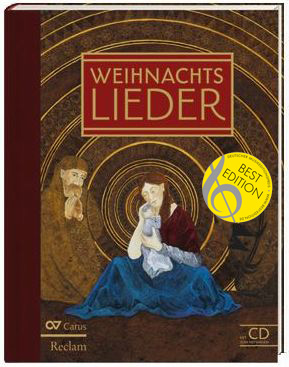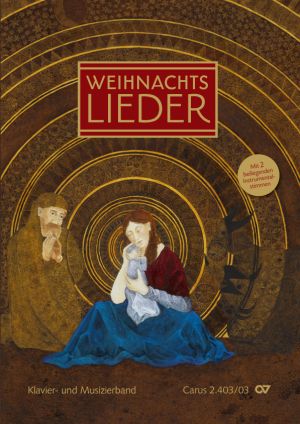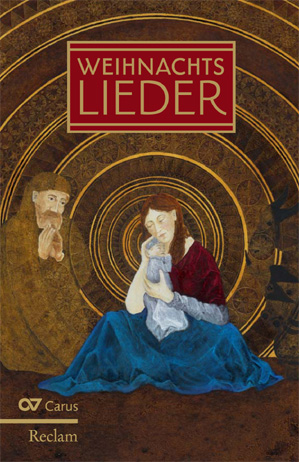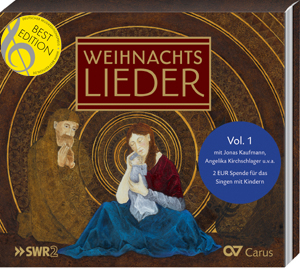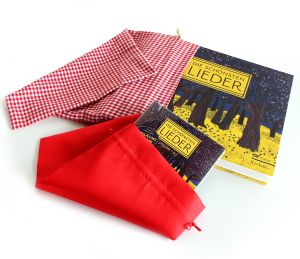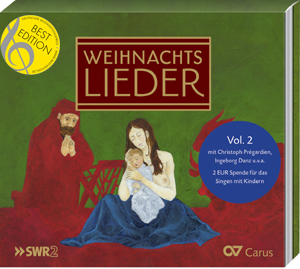
Weihnachtslieder CD Vol. 2
Many renowned German-speaking singers – among others, Jonas Kaufmann, Angelika Kirchschlager and Christoph Prégardien – and ensembles have recorded their favorite Christmas carol exclusively for the song project. The recordings are presented in two lavishly designed CD boxes with elaborately illustrated booklets. All the singers, as well as their accompanists participated in this recording without remuneration. For every CD sold, 2 EUR will be donated to projects promoting singing with children.
With Jonas Kaufmann, Angelika Kirchschlager, Dorothee Mields, Franz-Josef Selig, Cornelius Hauptmann, Franz Vitzthum, Sarah Wegener, Kammerchor Stuttgart, SWR Vokalensemble Stuttgart, Calmus Ensemble etc
Purchase
Additional product information
Contents
-
Preface writer
Cornelius Hauptmann
| 1951
-
Choir
Kammerchor Stuttgart
The Kammerchor Stuttgart is regarded as one of the best ensembles of its kind. Over its fifty-year existence, Frieder Bernius has developed the choir into an exceptional ensemble acclaimed by audiences and press alike. This has led to invitations for the choir to perform at all the important European festivals. In Germany the chamber choir performs at festivals and in concert halls in repertoire ranging from the 17th to the 21st century. Frieder Bernius and his ensemble have received numerous accolades for their contribution to new music. The Kammerchor Stuttgart has made over 80 CDs and LPs, numerous of which have been awarded international recording prizes (including the Edison award, Diapason d’or, Gramophone Choice, Classical Internet Award, International Classical Music Award, and German Record Critics’ Award prizes). The International Federation for Choral Music has invited the ensemble to sing at the 1st, 4th and 10th World Symposia on Choral Music in Vienna, Sydney and Seoul. Regular tours of North America and Asia since 1988 and a South America tour reflect the Kammerchor Stuttgart’s international reputation. Since 1984 the top ensemble has also been invited to Israel biennially. Personal details
-
Ensemble
Knabenchor collegium iuvenum Stuttgart
The ecumenical boys’ choir Knabenchor collegium iuvenum Stuttgart, based at the Stuttgart cathedral singing school, is independent both denominationally and as an institution. Founded in 1989, it sees its objective not only as purely musical, but also as extracurricular youth education and socio-political mission. The aim of the musical work is to continue the more than thousand-year-old tradition of famous boys’ choirs and to carry on the centuries-old culture of spiritual choral music. The choir’s particular strength lies in its very broad repertoire, which includes especially works of sacred choral music from the Renaissance to the modern age. The boys’ choir collegium iuvenum Stuttgart has been set up as a choir school. It systematically works with young people, beginning at pre-school age, but it is not a boarding school choir. Currently it consists of about 190 singers. The boys begin early musical training at the age of five. There are several age groups, culminating in the concert choir. After the change of voice, many singers return to sing in the men’s choir and then remain associated with the choir as active singers until they are about 25 years old. In addition to a well-founded musical education, the educators in charge place emphasis on the fact that the boys develop joy in singing. In learning the literature, the boys and young men should not only learn notes but also spiritually apprehend and emotionally grasp the respective work. Since summer 2013, Michael ?ulo has been the director of the choir. It is subsidized by the Förderverein collegium iuvenum Stuttgart e.V., a publicly registered sponsor of free youth welfare and extracurricular youth education. With their contributions and donations, the more than 700 members of the association cover part of the expenses for vocal training, concerts, travel, rehearsal and office space. Thanks to the extraordinary commitment of many active and former choir members, parents and friends and the support of the state capital Stuttgart and the state of Baden-Württemberg, the boys’ choir collegium iuvenum Stuttgart has attained a high musical and artistic standard equal to that of top European choirs. It can be heard regularly throughout the year in concerts and church services in Stuttgart and the region. Annual concert tours have taken the young choristers to France, Spain, Finland, Austria, Switzerland, Norway, Poland, Italy, Canada and the USA. Personal details
-
Ensemble
Ensemble 94
The Ensemble 94 was founded by Kay Johannsen in 1994 to participate in musical activities in the Stiftskirche (collegiate church) in Stuttgart, but since then it has also performed in many independent orchestral projects. Its members come from Germany, Holland, Belgium, Italy and Switzerland, and they are widely experienced as soloists and in chamber music. An uncommon feature of the ensemble is the fact that the players have the ability to play either baroque or modern instruments, in accordance with the stylistic epoch of the music being performed. The concert master of the ensemble is Christine Busch, Professor of violin at the Stuttgart Conservatory. According to the Stuttgarter Nachrichten, this ensemble is characterized by “boundless zest for music making” as well as “subtile dynamic” and “joy in articulatory detail.” The Stuttgarter Zeitung stated “soloists performing with verve, elegance and stylistic sensitivity” and found that the group “need not shun comparison with the best Baroque orchestras.” The Württembergische Blätter für Kirchenmusik wrote about the Telemann-CD “In the accompaniment by Ensemble 94, founded by Johannsen in 1994, the singers were provided with an appropriate ensemble of exquisite articulation, at all times subservient to the vocal line, which left nothing to be desired.” Personal details
-
Ensemble
SWR Vokalensemble Stuttgart
-
Ensemble
Orpheus Vokalensemble
The Orpheus Vokalensemble was founded in 2005 as the professional chamber choir of the Landesmusikakademie Baden-Württemberg. This is an international ensemble which places the highest vocal demands on its members. Internationally recognized choral conductors are engaged for each assignment, and they exercise lasting influence on the artistic quality of the ensemble. Its model is the legendary Orpheus Chamber Orchestra (New York), whose name it shares. Its artistic aims, in the preparation and performance of works, are to bring the fundamentals of chamber music – personal commitment and mutual respect – to bear on the work of a vocal ensemble. Its members have the right to participate in the choice of repertoire, soloists, conductors and concert programs. Several composers have already written works for the Orpheus Vokalensemble, including Bo Hansson, Knut Nystedt, Gregor Hübner and Jürgen Essl. In 2006 the ensemble was invited to the International Lake Constance Festival. Other invitations to important festivals have followed. Personal details
-
Ensemble
Thomanerchor Leipzig
-
Ensemble
Lords of the Chords
-
Ensemble
sirventes berlin
The vocal ensemble sirventes berlin is totally dedicated to early music for small forces and new a cappella music. The group is committed to neglected works from Germany’s rich musical heritage. At the same time the musicians offer a platform for new compositions and engage in interdisciplinary projects. The ensemble comprises soloists from the Berlin Radio Choir, the RIAS Kammerchor and freelance singers. For almost five years sirventes berlin, in a double quartet formation, has presented “NoonSong” concerts every Saturday at 12:00 noon in the Church at Hohenzollernplatz in Berlin- Wilmersdorf – a musical hour of prayer based on the model of Anglican evensong. These performances have resulted in a repertoire of over 200 a cappella motets, including ten premieres. Since then NoonSong has gone on to become more than just an insiders’ tip; every week 150 to 200 visitors listen to the polyphonic liturgy. As supporters of a living tradition, Berlin being the only place where it can be heard in this form in Germany, sirventes berlin made a very successful guest appearance at the Abu Gosh Vocal Festival in Israel in the summer of 2013. Personal details
-
Conductor
Frieder Bernius
| 1947Frieder Bernius’s work has earned great worldwide recognition. He is in demand internationally as a conductor and as a teacher. His principal artistic collaborators are the ensembles he founded himself, the Kammerchor Stuttgart, the Barockorchester Stuttgart, the Hofkapelle Stuttgart and the Klassische Philharmonie Stuttgart. As a guest conductor, he has collaborated repeatedly with, for example, the SWR Vokalensemble Stuttgart, the Deutsche Kammerphilharmonie Bremen, the Stuttgarter Kammerorchester and the Streicherakademie Bozen. Great stylistic versatility is Frieder Bernius’s hallmark. Whether he conducts vocal works by Monteverdi, Bach, Händel, Mozart, Beethoven, Fauré and Ligeti, stage music by Mendelssohn or symphonies by Haydn, Burgmüller and Schubert, his work always aims for a sound that is at once unmistakably personal and at the same time oriented towards the original period sound ideal. He devotes himself equally to the rediscovery of 18th century operas and to first performances of contemporary compositions. He is particularly interested in the musical history of southwestern Germany. Carus-Verlag has awarded Frieder Bernius a Golden CD for his complete recording of the sacred music of Felix Mendelssohn Bartholdy. The award was presented to him during the German Choir Festival in Stuttgart 2016. The sale of over 250,000 recordings, which has been acclaimed with a number of awards, has made a not insignificant contribution to what today is the obvious presence of Mendelssohn's complete œuvre in the concert repertoire. Personal details
-
Conductor
Friedemann Keck
-
Conductor
Kay Johannsen
| 1961
-
Conductor
Marcus Creed
The conductor Marcus Creed was born and grew up on the south coast of England. He began his studies at King’s College in Cambridge, where he had the opportunity to sing in the famous King’s College Choir. Further studies took him to Christ Church in Oxford and the Guildhall School in London. Marcus Creed moved to Berlin in 1977. Stations in his professional career have been the Deutsche Oper Berlin and the Hochschule der Künste, as well as the Gruppe Neue Musik and the Scharoun Ensemble. From 1987 to 2001, Marcus Creed was artistic director of the RIAS-Kammerchor. In 1998, he accepted a professorship for conducting at the Musikhochschule in Cologne. Marcus Creed has been artistic director of the SWR Vokalensemble Stuttgart since 2003. His particular objective with this ensemble has been to make renewed performances of outstanding compositions from the recent past, including, for example, works by Luigi Nono, György Kurtág, Wolfgang Rihm or Heinz Holliger. Marcus Creed is regularly invited to international festivals for both early music and new music and he regularly collaborates with the Akademie für Alte Musik Berlin, the Freiburger Barockorchester and Concerto Köln. His CD releases have won international awards for their stylistically sure and acoustically sensitive interpretations. Among others, he has been awarded the German Record Critics’ Award, the Edison Award, the Diapason D’Or, the Cannes Classical Award, and the Echo Classic Prize. Personal details
-
Conductor
Michael Alber
| 1963
-
Conductor
Stefan Schuck
| 1963
-
Conductor
Georg Christoph Biller
| 1955-2022Thomaskantor seit 1992 Personal details
-
Soloist
Klaus Mertens
-
Soloist
Christoph Prégardien
As one of the outstanding lyric tenors of today, Christoph Pregardien is highly regarded as a lieder singer. He specializes in lieder and oratorio and his repertoire encompasses all periods. Christoph Pregardien and his accompanist Michael Gees received the MIDEM Classical Award 2009 for their recording of Schubert’s “Die schone Mullerin”. Personal details
-
Soloist
Christine Müller
Christine Müller, mezzo-soprano, studied in Trossingen and Vienna . She is a sought-after concert and lied singer with a broad repertoire who concertizes both at home and abroad. Numerous radio, television and CD productions document her achievements as a singer. She has earned special merit through her discoveries and publications of forgotten musical works, especially in the field of the lied. Personal details
-
Soloist
Lydia Teuscher
-
Soloist
Julian Prégardien
-
Soloist
Andreas Weller
-
Soloist
Monika Mauch
The soprano Monika Mauch studied singing initially with Richard Wistreich at the Institute of Early Music at the Musikhochschule Trossingen. She continued her training by studying for a year with Jill Feldman in Paris. Since the beginning of her singing career she has focused primarily on projects in the field of early music. She has worked with such leading ensembles as the Ricercar Ensemble, Taverner Consort, Red Byrd, the Hilliard Ensemble, L’arpa festante (Munich), the Ensemble Daedalus (Geneva), CordArte Ensemble (Cologne), and Montreal Baroque. Monika Mauch’s vocal achievements are documented on numerous radio and CD recordings. Her recordings for the Altbachische Archiv and the B minor Mass with Cantus Coelln and her “Morimur” CD with the Hilliard Ensemble have attracted especial attention. As a concert singer Monika Mauch works on a regular basis with conductors such as Roland Wilson, Manfred Cordes, René Jacobs and Philippe Herreweghe. Personal details
-
Soloist
Sarah Wegener
-
Soloist
Ingeborg Danz
-
Soloist
Paulina Elsner
| 2000
-
Soloist
Ruth Sandhoff
The repertoire of mezzo-soprano Ruth Sandhoff ranges from early Baroque works to contemporary compositions. Lied singing is her especial passion, also in collaboration with the choreographer Sasha Waltz. Ruth Sandhoff has given concert tours in the USA, in Australia and in Europe. She has participated in numerous CD productions both in Germany and abroad. The recording of J. C. Bach’s “Missa da Requiem” with the RIAS Chamber Choir was awarded the German Record Critics’ Award. Personal details
-
Soloist
Dietrich Henschel
-
Soloist - harpsichord
Michael Schönheit
Michael Schönheit was the winner of the 1984 International Johann Sebastian Bach Competition in Leipzig. He was appointed organist of the Gewandhaus Leipzig in 1986, where – together with the ensemble ‘Merseburger Hofmusik’, which he founded in 1998 – he performed the complete cantatas and organ works of Dieterich Buxtehude in a threeyear concert series commemorating the 300th anniversary of Buxtehude’s death. Schönheit is also cathedral organist in Merseburg and artistic director of the ‘Merseburger Orgeltage’. He teaches organ at the ‘Hochschule für Musik Nürnberg’ and acts as juror in international competitions. He regularly performs with the Gewandhaus Orchestra Leipzig and has appeared with the ‘Sächsische Staatskapelle Dresden’, the Munich Philharmonic Orchestra and the New York Philharmonic Orchestra, as well as playing solo concerts in Europe, the USA and Japan. Personal details
-
Soloist - flute
Gaby Pas-Van Riet
-
Soloist - guitar
Carsten Linck
Das Repertoire des Gitarristen Carsten Linck umfasst die Musik der frühen Renaissance bis zu Uraufführungen zeitgenössischer Kompositionen. Schwerpunkt seines künstlerischen Schaffens ist die Kammermusik, v. a. die Liedbegleitung. In Zusammenarbeit mit Sängern, Instrumentalisten und verschiedenen Ensembles gastierte er auf Konzertreisen in Europa und Asien. 1992 erhielt er den Kulturpreis der Stadt Essen. Personal details
-
Soloist - piano
Götz Payer
-
Soloist - piano
Juliane Ruf
Juliane Ruf studied in Mannheim and Saarbrucken with, among others, Irwin Gage. Early in her career she began specializing in lied presentation. She has won many competitions, including the “Wettbewerb für Liedkunst Stuttgart,” and in the meantime she concertizes regularly at festivals such as the “Klavierfestival Ruhr” or the “Heidelberger Frühling.” Personal details
-
Soloist - piano
Michael Gees
-
Soloist - piano
Leonhard Elsner
| 1998
-
Soloist - piano
David Theodor Schmidt
-
Soloist - lute
Stefan Maass
Stefan Maass studied classical guitar and lute, specializing in music of the 17th and 18th centuries, both as a soloist and as a continuo player. He is Lord of Batzdorf Castle near Meißen and co-founder of the Batzdorf Hofkapelle. He regularly performs in the opera houses of Halle and Karlsruhe, the Semper Opera Dresden and the Gran Teatre del Liceu in Barcelona. His numerous CD productions include collaborations with the Dresdner Kammerchor conducted by Hans-Christoph Rademann and the Capella Sagittariana, the Dresdner Staatskapelle, Thomas Quasthoff, Daniel Hope and the contralto Britta Schwarz, as well as with the actors Corinna Harfouch and Michael Quast. Stefan Maass was awarded the prestigious Arras Prize for Art and Culture in Dresden in March 2000. Personal details
-
Soloist - lute
Hugh Sandilands
Hugh Sandilands was born in Scotland in 1952. He studied guitar at the University of Vancouver, then lute with R. Nurse (Vancouver) and H. Smith (Basel). He has performed in concerts and recorded with G. Garrido, the Ensemble Fitzwilliam, Le Concert Lorrain, Real Compania de Opera da Camera, Ensemble Baroque de Perpignan, Capella Nova Graz, La Sestina, Ensemble Daedalus and Private Musicke. Personal details
-
Soloist - oboe
Da-Yong Zhang
-
Soloist - organ
Kay Johannsen
| 1961
-
Soloist - viola
Janis Lielbardis
-
Soloist - violin
Christine Busch
-
Soloist - violin
Lukas Friederich
-
Soloist - violone
Barbara Pfeifer
Barbara Pfeifer performs in the gamba consort “Les Escapades,” as well as being their organizational manager. She is also an enthusiastic music pedagogue focusing on musical grassroots work. Personal details
-
Soloist - violone
Thomas Fritzsch
Thomas Fritzsch, a specialist for the music of the 17th and 18th centuries, is an internationally renowned and celebrated viola da gamba player. He performs in the concert halls of Europe as well as on the stages of metropolises such as New York, Boston, Tokyo, Seoul, Abu Dhabi, Dubai, Havana, Jerusalem and Tel Aviv. The names of the artists with whom Thomas Fritzsch has collaborated over the past three decades reads like a ‘Who’s Who’ of the international music scene. His profound knowledge of the field of historical music is documented in a plethora of radio and television productions, an extensive discography as well as various editions and musicological publications. Time and again, he has succeeded in making startling discoveries in seemingly well-known fields, such as, most recently, the world premiere and first recording of four hitherto unknown sonatas for viola da gamba and cembalo or fortepiano by Johann Christian Bach. Personal details
Frequent questions about this work
 There are no questions and answers available so far or you were unable to find an answer to your specific question about this work? Then click here and send your specific questions to our Customer Services!
There are no questions and answers available so far or you were unable to find an answer to your specific question about this work? Then click here and send your specific questions to our Customer Services!





